We are a strategic asset for UMKC’s missions of leading in health sciences; deepening and expanding strength in the visual and performing arts; developing a professional workforce and collaborating in urban issues and education; and creating a vibrant learning and campus life experience. We continued to make progress toward our defined goals and this document details the progress we have made during 2019.
During the last 6 months of 2019, the amount of support requests received fluctuated with the academic calendar, however total support requests received were higher than in the previous 3 years due to an increase in requests submitted via phone and email during September and October.
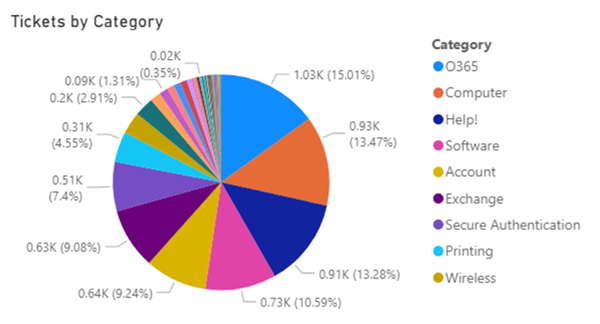
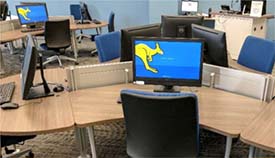 System-wide IT is currently engaged in a project to consolidate each of the University campuses user accounts into a single, shared domain. This is an effort that will reduce costs, strengthen support infrastructure, increase security, and result in a more efficient IT environment. This consolidation will ease the adoption of cloud services, off-the-shelf software, and promote the sharing of common resources system-wide. As part of this initiative Information Services played a key role in ensuring success at UMKC. A few of these activities include:
System-wide IT is currently engaged in a project to consolidate each of the University campuses user accounts into a single, shared domain. This is an effort that will reduce costs, strengthen support infrastructure, increase security, and result in a more efficient IT environment. This consolidation will ease the adoption of cloud services, off-the-shelf software, and promote the sharing of common resources system-wide. As part of this initiative Information Services played a key role in ensuring success at UMKC. A few of these activities include:
 UM System is currently migrating on premise services to Office 365. Users will then have access to all files and servers that will live in the cloud. During this review period, planning for MFA implementation began, and employee accounts were synced with O365. UMKC project team members coordinated campus communication, including emails, web page creation and edits, and developed support processes and documentation related to new services and changes.
UM System is currently migrating on premise services to Office 365. Users will then have access to all files and servers that will live in the cloud. During this review period, planning for MFA implementation began, and employee accounts were synced with O365. UMKC project team members coordinated campus communication, including emails, web page creation and edits, and developed support processes and documentation related to new services and changes.
![]() IS has completed the Windows 7 -> Windows 10 Migration with all systems either being upgraded or moved to off network.
IS has completed the Windows 7 -> Windows 10 Migration with all systems either being upgraded or moved to off network.
We continue to perform Windows 10 to Windows 10 build upgrades to keep our computing environment updated and stable. We have standardized on doing these upgrades annually to align with the major upgrades that Microsoft is releasing. Over 650 computers were upgraded. These upgrades are done over the network with limited Faculty/Staff downtime.
 After going live on October 1 there has been continued efforts locally, and with UM System, to further develop and utilized this new shared IT Service Management Solution.
After going live on October 1 there has been continued efforts locally, and with UM System, to further develop and utilized this new shared IT Service Management Solution.
During this period continued work on Cherwell was made. One of the larger projects was the completion of the 9.6 upgrade. IS created additional specifics to streamline the request process from faculty, students and staff.
IS started a new process to completely revamp the Network and Infrastructure “Moves, Adds, Changes” process, which until now has been running on custom forms.
![]() Over the last year, the campus standard has shifted to Mac OS 10.15. The support team built new processes to support this new version, including improved use of Apple’s Device Enrollment Program to improve security of UMKC owned Apple products.
Over the last year, the campus standard has shifted to Mac OS 10.15. The support team built new processes to support this new version, including improved use of Apple’s Device Enrollment Program to improve security of UMKC owned Apple products.
In addition, we performed multiple JAMF upgrades, which is the back-end solution that enables us to image and deploy software over the network. The imaging process was reworked to allow for faster imaging with fewer manual touches.
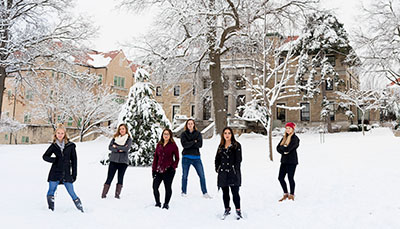 Leveraged our Mobile Device Management solution, AirWatch to manage numerous mobile devices across the campus. This tool is valuable for increasing efficiencies when managing mobile devices as well as protecting University data. As part of these efforts we upgraded AirWatch to version 9.7 to take advantage of the new version of iOS.
Leveraged our Mobile Device Management solution, AirWatch to manage numerous mobile devices across the campus. This tool is valuable for increasing efficiencies when managing mobile devices as well as protecting University data. As part of these efforts we upgraded AirWatch to version 9.7 to take advantage of the new version of iOS.
IS also completed a mobile device project for HR, which are used to help facilitate their search committees process.
Updated Windows 10 Universal Image to support current desktop and laptop standards. This also included updated software and security patches.
Creation of a new PCI compliant image based on Windows 10 1809 Long Term Services Branch.
Creation of a new beta image of Windows 10 1903, which will receive continued testing with University applications over the next period.
Updated 25 individual license servers with updated daemons and/or license files. with updated daemons and/or license files. This is required to keep software, both for computer labs and researchers able to run the latest version of their software. Some of the servers updated include MatchCad, Ansys, FME, Comsol, and Oxygen.
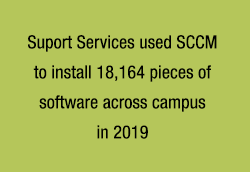 Lab Packaging
Lab PackagingConsiderable time was spent updating all the software applications used in the computer labs. Over 125 applications were updated, packaged with SCCM, and tested to ensure compatibility. This ensures that Faculty and Students have the latest versions of software, both in classrooms and in computer labs. While this is a significant amount of work to complete it greatly reduces the amount of time to update such a large number of computers.
Support Services worked with UM System and Adobe to renew our Adobe ELTA license agreement. This was a long and complicated process that directly impacts a large portion of Faculty and Staff that utilize this software. As part of the new agreement there were many changes put in place by Adobe that we had to account for, the most noticeable being the shift from computer-based licensing to named user licensing.
Over the last year we have completed the annual renewals for over 1,000 Adobe installations across campus. Included in this project was upgrading the Adobe CC software across campus to ensure students, faculty and staff had the latest version.
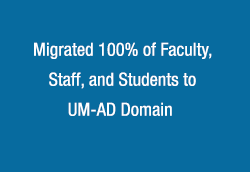 As a division, we have worked with several academic and business units to renovate, design, install, and provide ongoing support for multi-faceted information technology (IT) and audiovisual (AV) systems. The following sections discuss the key IT/AV projects,that consumed a significant amount of IS resources' time during this last review period.
As a division, we have worked with several academic and business units to renovate, design, install, and provide ongoing support for multi-faceted information technology (IT) and audiovisual (AV) systems. The following sections discuss the key IT/AV projects,that consumed a significant amount of IS resources' time during this last review period.
ClearScholar uses an approach called personas when coupled with the Civitas analytics insight make it a differentiator product. Other mobile solutions can provide content in a similar manner but usually to strictly defined groups. The algorithm and the overlapping approach make it unique. During this review period, we facilitated the ordering, testing, and installation of scanners at 8 dining registers and transitioned this project to the Provost’s Office as operational.
This project upgraded the existing Administrative Center and Newcomb Hall data center networks. The new networks utilize a “spine and leaf” design allowing us to purchase the needed number of interfaces while allowing for easy expansion for the future. The new network equipment greatly increased the number of available 10 GB copper and fiber interfaces and also supports 40 GB & 100 GB interfaces where needed. The new “spine” switches are geographically separated across the two data centers. This equipment also allows us to implement a software-defined network (SDN) features as needed in the future. The switches were installed and configured during this review period and the project was completed.
The project is to move Ad Astra from an onsite server to a cloud-hosted service and upgrade to the latest software version. This project was completed and closed during this review period.

As part of our continual process in keeping the highest quality student experience in our student classrooms and learning spaces, IS upgraded 6 ILE rooms in FY19 to HD widescreen digital video systems with enhanced audio processing, web conferencing, and wireless collaboration features. During this review period, we partnered with Campus Facilities Management to install infrastructure for the systems and installed the new equipment in various spaces in Haag Hall, Royall Hall, Grant Hall and Cockefair Hall.
This is a project upgraded the existing CBORD ID Works card production system, which was 12 years old, with Datacard TruCredential and Datacard SD460 card printers. New features and enhancements include TruCredential, which provides flexibility to capture student images and date anywhere on campus using remote stations, tablets, or smartphones. This software also enables us to issue ID cards with smart chips, magnetic stripe, radio frequency, or other machine-readable technologies. During this review period, we converted the card system to CS Gold, coordinating the training of staff, and decommissioned the old CS Odyssey servers.
This project transitioned our primary supported web conferencing tool from Cisco WebEx to Zoom. UM System purchased Zoom for all four campuses, and as a result, UMKC expects cost savings associated with decommissioning WebEx on our campus. During this review period, we Information Services Accomplishments July - December 2019 31 communicated with existing WebEx users and helped to transition those users to Zoom. We also developed campus-wide communication and support documentation for use of Zoom as a web conferencing tool and the project was completed.
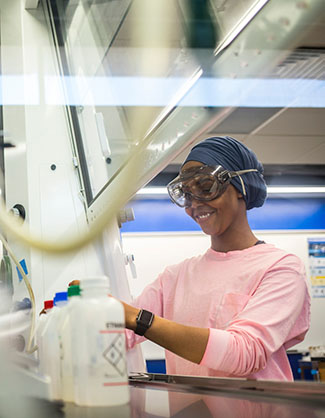 NNetwork Architecture is responsible for the installation and maintenance of departmental level firewalls. These firewalls protect specialized hardware or data (HIPPA, PCI, etc.) in specific locations across on the UMKC network. Activities include maintaining appliance firmware and security rules.
NNetwork Architecture is responsible for the installation and maintenance of departmental level firewalls. These firewalls protect specialized hardware or data (HIPPA, PCI, etc.) in specific locations across on the UMKC network. Activities include maintaining appliance firmware and security rules.
Equipment managed:
 Database Server Design, Implementation and Administration
Database Server Design, Implementation and AdministrationProvided maintenance and support for 62 software applications, websites and services including:
Provided campus representation on the following working groups:
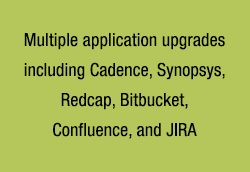 IS Foundation Services (ISFS) provides secure, professionally managed data centers to meet the growing information technology (IT) needs of academic and administrative units at UMKC. ISFS serves as the primary system administrators for 400+ servers, provides assistance and technical support for campus IT Liaisons, supports the Google Cloud Platform (GCP) for UMSystem, and provides research computing training and support.
IS Foundation Services (ISFS) provides secure, professionally managed data centers to meet the growing information technology (IT) needs of academic and administrative units at UMKC. ISFS serves as the primary system administrators for 400+ servers, provides assistance and technical support for campus IT Liaisons, supports the Google Cloud Platform (GCP) for UMSystem, and provides research computing training and support.
On this page